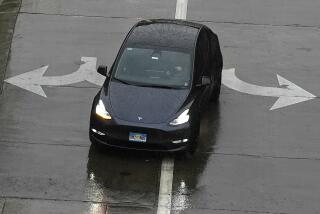Bikes help commuters get around fuel prices
- Share via
High gasoline prices are fueling bicycle sales, and on some days Michael Hall’s blood pressure. ¶ At least three times a week, Hall pedals to his job in Hollywood from his home in northern Glendale, a 25-mile round-trip commute that is faster on two wheels than four. ¶ “It’s definitely saving me money, but may be taking years off my life due to the fact that it’s a terrifying experience,” said Hall, a 46-year-old television editor. The problems, he said, include the cellphone-using, “coffee-drinking, shaving, makeup-putting-on person who’s not paying attention” and the furious motorists who swear at him if he slows them down “for a nanosecond.” ¶ For his trouble, Hall saves about $150 a month, which makes it all worthwhile. ¶ Industry sales numbers for the year aren’t available yet, but anecdotal evidence is widespread that bicycle companies are benefiting from what’s hurting other businesses, said Tim Blumenthal, executive director of Bikes Belong Coalition, an advocacy group.
“Bicycles for transportation has not been a big thing until very recently,” he said. “April and particularly May, and now June, have been phenomenal months. This is across the board and across the country.”
As the weather has improved -- and pump prices have continued to rise -- merchants have noticed an increase.
“This is the first time we’ve seen this much growth from the gas problem,” said Jim Whitsett, owner of Cynergy Cycles in Santa Monica, where sales are up “a noticeable 20% just in the past 30 days.”
Increasingly, people who used to view bicycles as playthings or exercise tools now see them as workhorses. So they’re outfitting them with fenders, racks, bags -- anything that will make them more functional.
Burley Design, which makes trailers for bikes, has run out of some models used to haul children and groceries.
“We’re definitely ahead of where we thought we would be,” said Amanda Schulze, marketing manager for the Eugene, Ore., company, which expects sales to rise 10% this year.
It’s too soon, though, to call 2008 a boom year for bikes, said Fred Clements, executive director of the National Bicycle Dealers Assn. in Costa Mesa. People who buy bicycles for fun or fitness still represent the largest chunk of the market, he said, and they may be less willing to spend this year, given the troubled economy.
“We’re certainly having an uptick in utility use, but we may have a corresponding decline in recreational purchasing,” he said. “You can’t underestimate the power of a weak economy to make people rein in some of their spending.”
Staying in shape is important to Bryan Martinez, 44, and so is avoiding gas stations. So the Altadena resident has recently upped his cycling to about 250 miles a week, most of it riding back and forth to Comcast Entertainment, where he works as a television editor.
“We only have one income, and it just made more sense for me to ride,” he said. “Now I’m kind of addicted to riding to work.”
Although his office isn’t equipped with showers, Martinez keeps several changes of clothing at his office and uses the sink to rinse off. “Paper towel, sponge bath. It’s fine,” he said.
Not all two-wheeled sources of transportation require so much energy.
Cannondale Sports Group introduced its line of Schwinn electric bikes last year and was caught off guard in recent months as demand pulled past supply. The bikes sell for $1,500 to $2,500.
“Over the last four months, we’ve seen significant increase in demand,” said spokesman Bruno Maier. “We didn’t anticipate the spike that we’ve seen. Right now we are working to get additional product in to supply our dealers.”
Bicycles, of course, aren’t the only two-wheeled option. In fact Hall, the TV editor from Glendale, is in the market for a scooter.
“Unfortunately, nobody has any in stock,” he said. “They sell them as soon as they come in.”
Some who can’t afford to invest in a new mode of transportation are dusting the cobwebs off their old bicycles.
Demand is so strong at Rock N’ Road Cyclery’s service departments that repairs are running a week behind, said Matt Ford, who owns the Lake Forest-based chain of four Orange County stores. Bicycle sales, meanwhile are “up double digits,” he said.
“We’ve really seen a spike,” he said. “The gas thing is freaking a lot of people out.”
--






